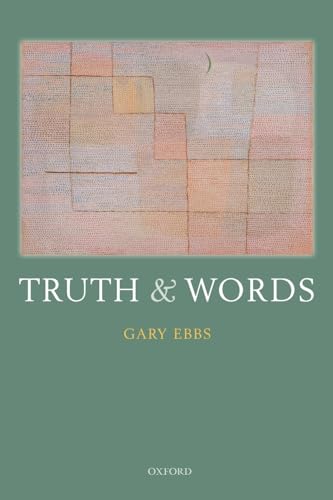Items related to Truth and Words

Synopsis
To clarify and facilitate our inquiries we need to define a disquotational truth predicate that we are directly licensed to apply not only to our own sentences as we use them now, but also to other speakers' sentences and our own sentences as we used them in the past. The conventional wisdom is that there can be no such truth predicate. For it appears that the only instances of the disquotational pattern that we are directly licensed to accept are those that define "is true" for our own sentences as we use them now. Gary Ebbs shows that this appearance is illusory. He constructs an account of words that licenses us to rely not only on formal (spelling-based) identifications of our own words, but also on our non-deliberative practical identifications of other speakers' words and of our own words as we used them in the past. To overturn the conventional wisdom about disquotational truth, Ebbs argues, we need only combine this account of words with our disquotational definitions of truth for sentences as we use them now. The result radically transforms our understanding of truth and related topics, including anti-individualism, self-knowledge, and the intersubjectivity of logic.
"synopsis" may belong to another edition of this title.
About the Author
Gary Ebbs is Professor of Philosophy at Indiana University, Bloomington, and has previously held faculty positions at University of Illinois, Urbana, University of Pennsylvania, and Harvard University. He is the author of Rule-Following and Realism (Harvard Press, 1997), and has published a number of articles on such topics as sameness of reference between speakers and across time, learning from others by trusting what they say, the compatibility of anti-individualism with self-knowledge, Hilary Putnam's views of truth and reference, and W.V. Quine's and Rudolf Carnap's debate about analyticity and truth by convention.
"About this title" may belong to another edition of this title.
US$ 23.43 shipping from Ireland to U.S.A.
Destination, rates & speedsSearch results for Truth and Words
Truth and Words
Seller: The Secret Book and Record Store, Dublin, DUB, Ireland
Soft cover. Condition: Very Good. Slight shelf wear only, otherwise as new. Seller Inventory # 4115
Quantity: 1 available
Truth and Words
Seller: HPB-Red, Dallas, TX, U.S.A.
paperback. Condition: Good. Connecting readers with great books since 1972! Used textbooks may not include companion materials such as access codes, etc. May have some wear or writing/highlighting. We ship orders daily and Customer Service is our top priority! Seller Inventory # S_411797497
Quantity: 1 available
Truth and Words
Seller: GreatBookPrices, Columbia, MD, U.S.A.
Condition: New. Seller Inventory # 12750049-n
Quantity: Over 20 available
Truth and Words
Print on DemandSeller: PBShop.store US, Wood Dale, IL, U.S.A.
PAP. Condition: New. New Book. Shipped from UK. THIS BOOK IS PRINTED ON DEMAND. Established seller since 2000. Seller Inventory # L0-9780199692262
Quantity: Over 20 available
Truth and Words
Print on DemandSeller: PBShop.store UK, Fairford, GLOS, United Kingdom
PAP. Condition: New. New Book. Delivered from our UK warehouse in 4 to 14 business days. THIS BOOK IS PRINTED ON DEMAND. Established seller since 2000. Seller Inventory # L0-9780199692262
Quantity: Over 20 available
Truth and Words (eng)
Seller: Brook Bookstore On Demand, Napoli, NA, Italy
Condition: new. Questo è un articolo print on demand. Seller Inventory # 2290804c806b7bf837a0387c73bc2402
Quantity: Over 20 available
Truth and Words
Seller: Rarewaves.com USA, London, LONDO, United Kingdom
Paperback. Condition: New. To clarify and facilitate our inquiries we need to define a disquotational truth predicate that we are directly licensed to apply not only to our own sentences as we use them now, but also to other speakers' sentences and our own sentences as we used them in the past. The conventional wisdom is that there can be no such truth predicate. For it appears that the only instances of the disquotational pattern that we are directly licensed to accept are those that define 'is true' for our own sentences as we use them now. Gary Ebbs shows that this appearance is illusory. He constructs an account of words that licenses us to rely not only on formal (spelling-based) identifications of our own words, but also on our non-deliberative practical identifications of other speakers' words and of our own words as we used them in the past. To overturn the conventional wisdom about disquotational truth, Ebbs argues, we need only combine this account of words with our disquotational definitions of truth for sentences as we use them now. The result radically transforms our understanding of truth and related topics, including anti-individualism, self-knowledge, and the intersubjectivity of logic. Seller Inventory # LU-9780199692262
Quantity: Over 20 available
Truth and Words
Seller: Best Price, Torrance, CA, U.S.A.
Condition: New. SUPER FAST SHIPPING. Seller Inventory # 9780199692262
Quantity: 1 available
Truth and Words
Seller: Lucky's Textbooks, Dallas, TX, U.S.A.
Condition: New. Seller Inventory # ABLIING23Feb2215580056735
Quantity: Over 20 available
Truth and Words
Seller: Ria Christie Collections, Uxbridge, United Kingdom
Condition: New. In. Seller Inventory # ria9780199692262_new
Quantity: Over 20 available

